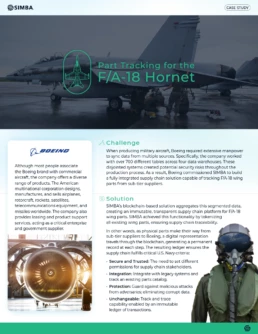Part Tracking for the F/A-18 Hornet
Although most people associate the Boeing brand with commercial aircraft, the company offers a diverse range of products. The American multinational corporation designs, manufactures, and sells airplanes, rotorcraft, rockets, satellites, telecommunications equipment, and missiles worldwide. The company also provides leasing and product support services, acting as a critical enterprise and government supplier.
Challenge
When producing military aircraft, Boeing required extensive manpower to sync data from multiple sources. Specifically, the company worked with over 700 different tables across four data warehouses. These disjointed systems created potential security risks throughout the production process. As a result, Boeing commissioned SIMBA to build a fully integrated supply chain solution capable of tracking F/A-18 wing parts from sub-tier suppliers.
Solution
SIMBA’s blockchain-based solution aggregates this segmented data, creating an immutable, transparent supply chain platform for F/A-18 wing parts. SIMBA achieved this functionality by tokenizing all existing wing parts, ensuring supply chain traceability.
In other words, as physical parts make their way from sub-tier suppliers to Boeing, a digital representation travels through the blockchain, generating a permanent record at each step. The resulting ledger ensures the supply chain fulfills critical U.S. Navy criteria:
- Secure and Trusted: The need to set different permissions for supply chain stakeholders.
- Integration: Integrate with legacy systems and track an existing parts catalog.
- Protection: Guard against malicious attacks from adversaries; eliminating corrupt data.
- Unchangeable: Track and trace capability enabled by an immutable ledger of transactions.
Results
SIMBA’s supply chain solution for F/A-18 wing parts increases visibility, enables ongoing data tracking in real-time, and improves trust across stakeholders. Since the early stages of the project, this improved functionality has reduced costly paperwork by 40%, dramatically improving the traceability of each aircraft component.
Through this effort, Boeing is taking a proactive approach to supply chain management, implementing solutions before tragedy triggers track and trace forensics. In addition to improved pilot safety, supply chain transparency helps expedite repairs and preventative maintenance. This improvement provides the U.S. Navy with a more reliable fleet, inherently bolstering national defense.
Finally, because blockchain establishes part provenance, there are fewer instances of unknown origin. As a result, 15% fewer sub-tier supplier parts are discarded, reducing costs. This provenance also ensures parts are invariably traceable to the sub-tier level, making the supply chain much more efficient and effective.
Challenge
When producing military aircraft, Boeing required extensive manpower to sync data from multiple sources. Specifically, the company worked with over 700 different tables across four data warehouses. These disjointed systems created potential security risks throughout the production process. As a result, Boeing commissioned SIMBA to build a fully integrated supply chain solution capable of tracking F/A-18 wing parts from sub-tier suppliers.
Solution
SIMBA’s blockchain-based solution aggregates this segmented data, creating an immutable, transparent supply chain platform for F/A-18 wing parts. SIMBA achieved this functionality by tokenizing all existing wing parts, ensuring supply chain traceability.
In other words, as physical parts make their way from sub-tier suppliers to Boeing, a digital representation travels through the blockchain, generating a permanent record at each step. The resulting ledger ensures the supply chain fulfills critical U.S. Navy criteria:
- Secure and Trusted: The need to set different permissions for supply chain stakeholders.
- Integration: Integrate with legacy systems and track an existing parts catalog.
- Protection: Guard against malicious attacks from adversaries; eliminating corrupt data.
- Unchangeable: Track and trace capability enabled by an immutable ledger of transactions.
Results
SIMBA’s supply chain solution for F/A-18 wing parts increases visibility, enables ongoing data tracking in real-time, and improves trust across stakeholders. Since the early stages of the project, this improved functionality has reduced costly paperwork by 40%, dramatically improving the traceability of each aircraft component.
Through this effort, Boeing is taking a proactive approach to supply chain management, implementing solutions before tragedy triggers track and trace forensics. In addition to improved pilot safety, supply chain transparency helps expedite repairs and preventative maintenance. This improvement provides the U.S. Navy with a more reliable fleet, inherently bolstering national defense.
Finally, because blockchain establishes part provenance, there are fewer instances of unknown origin. As a result, 15% fewer sub-tier supplier parts are discarded, reducing costs. This provenance also ensures parts are invariably traceable to the sub-tier level, making the supply chain much more efficient and effective.
Boeing
We recognized the benefits of blockchain and wanted to begin tracking parts for F-18s using the technology. SIMBA Chain allowed us to quickly set up smart contracts to autogenerate APIs, saving us countless hours and eliminating the need to assign blockchain-focused developersAl Salour, Technical Fellow - Boeing
The Boeing-built F/A-18 is a competent tactical aircraft, forming the backbone of the U.S. Navy carrier air wing. These combat-proven planes deliver cutting-edge, next-generation multi-role strike fighter capability, outdistancing current and emerging threats. However, before combat, F/A-18 aircraft need to be built—herein lies the challenge. With millions of parts coming from multiple sub-tier suppliers, F/A-18 production is a complicated process.
Speaking on this complexity, SIMBA Chain CEO Bryan Ritchie explains, “Historically, email has been the most prominent supply chain communication tool. And while it gets the job done, it also requires a lot of back and forth, offering little protection against bad actors looking to manipulate data. We’re solving this problem by bringing components of the Boeing supply chain into a completely synchronized, automated system. Instead of tracking manually, all digital workflows are codified in the blockchain ledger.”
This continuous, automated, transparent communication underpins SIMBA’s supply chain solution. Instead of working across silos, the blockchain-based supply chain provides invaluable oversight.
